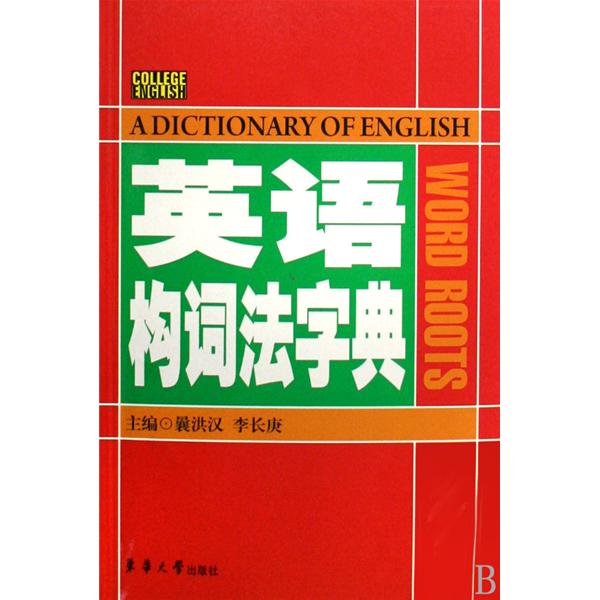基本介紹
形式
v.化n.
①Let's go out for a walk.我們到外面去散散步吧。
②He is a man of strong build.他是一個體格健壯的漢子。
③Let's have a swim.咱們游泳吧。
n.化v.
①Did you book a seat on the plane?你訂好飛機座位了嗎
②Please hand me the book.請把那本書遞給我。
③She nursed her husband back to health.她看護丈夫,使他恢復了健康。
④We lunched together.我們在一起吃了午餐。
有少數形容詞可以轉化為動詞。例如:
We will try our best to better our living conditions.我們要盡力改善我們的生活狀況。
adv.化v.
Murder will out.(諺語)惡事終必將敗露。
adj.化n.
①You should be dressed in black at the funeral.你在葬禮中該穿黑色衣服。
②The old in our village are living a happy life.我們村的老年人過著幸福的生活。
派生法在詞根前面加前綴或在詞根後面加後綴構成一個與原單詞意義相近或截然相反的新詞叫作派生法。
方法
混合法
news broadcast→newscast新聞廣播
television broadcast→telecast電視播送
smoke and fog→smog煙霧
helicopter airport→heliport直升飛機場
首尾字母縮略法首尾字母縮略法,即用單詞首尾字母組成一個新詞。讀音主要有兩種形式,即各字母分別讀音;作為一個單詞讀音。
very important person→VIP (讀字母音)要人;大人物
television→TV (讀字母音)電視
Testing of English as a Foreign Language→TOEFL托福
Nato
截成法
a. 截去詞的尾部:ad = advertisement(廣告),demo = demonstration(演示), expo = exposition(展覽會),pro = professional(專業人員),gents = gentleman’s lavatory (男廁),pub = public house(酒店),stereophonic(立體聲)
b. 截去詞的首部:phone = telephone(電話),plane = airplane(飛機),chute = parachute (降落傘),copter = helicopter(直升機)
c. 截去詞的首部和尾部:flu = influenza(流感),tec = detective(偵探),fridge = refrigerator (冰櫃)
混成法(blending)混成法就是把一個詞與另一個詞“混成一體”來構成合成詞的方法。從形態結構看,混成法大致可 分成以下四類:
--Chunnel (channel + tunnel) 海峽隧道
--brunch (breakfast + lunch) 早午餐
--telecast (television + broadcast) 電視廣播
--smog (smoke + fog) 煙霧
--bit (binary digit) 位元(二進制中一單位)
--travelogue (travel + catalogue) 旅行見聞講座
--lunarnaut (lunar + astronaut) 登月太空人
--airtel (air + hotel) 機場賓館
--faction (fact + fiction ) 紀實文學
--slimnastics (slim + gymnastics) 減肥體操
--docudrama (document + drama) 記錄片
--medicare (medical + care) 醫療照顧方案
--helipad (helicopter + pad) 直升飛機升降場
--psywarrior (psychological + warrior) 心理戰專家
--telediagnosis (television + diagnosis) 遠距偵探
--moped (motor pedal-cycle) 輕型腳踏機車
--comsat (communications + satellite) 通訊衛星
--sitcom (situation + comedy) 情景喜劇
--comint (communications + intelligence) 通訊情報
--sci-fi (science + fiction) 科幻小說
在現代英語中,很多混成詞已經牢固確定,而且已成為新構詞很有構詞力的樣板。例如:從 cheeseburger (夾乾酪肉三明治)到beefburger(夾牛肉三明治),shrimpburger 夾蝦肉三明治);從motel到botel (汽艇遊客旅館boat + hotel),aquatel (水上飯店 aquatic + hotel) ;從washeteria (自助洗衣店wash + cafeteria) 到 candyteria (自助糖果店),luncheteria (自助小吃館)。
逆成法 (back formation)逆成法與下面一節中的綴合法恰好相反,綴合法借用此綴構成新詞,而逆成法則去掉被誤認的後綴構成新詞。例如:televise由television刪去-ion逆生而成。利用這種構詞手段創造的新詞叫做逆生詞。逆生詞多半屬動詞,形成逆成詞的原形詞最多的是名詞和形容詞。
逆生詞
--swindler à swindle (詐欺)
--beggar à beg (乞討)
--donation à donate (捐贈)
--editor à edit (編輯)
--orator à orate (演說)
--burglar à burgle (盜竊)
--resurrection à resurrect (復活)
--aggression à aggress (侵略)
--caretaker à caretake (暫時看管)
--free-association à free associate (自由聯想)
--automation à automate (使自動化)
--escalation à escalate (逐步升級)
--laser à lase (發射雷射)
--helicopter à helecopt (用直升飛機運送)
--gloomy à gloom (變陰暗)
--cozy à coze (使感到舒適)
--lazy à laze (偷懶)
--greedy à greed (貪婪)
--gruesome à grue (因害怕發抖)
綴合法 (affixation)英語詞綴分為前綴和後綴兩種。一般來說,前綴只是改變詞的意義,但不改變其詞類。後綴不僅改變詞的意義,而且使單詞由一種詞類轉變為另一種詞類。
前綴法
in-,im-,il-,ir-表示“not”“the converse of”。例如:inefficient (無效率的),infrequent(不頻繁的),improper(不合適的),impossible(不可能的),illiterate(無文化的),irregular(不規則的)
non-表示“not”“the lack of”“the opposite of”。例如:nonaggression(不侵犯),nonconductor (絕緣體),nonsense(廢話),nonsmoker(不抽菸的人),nonfiction(非小說的散文文學),nonviolent(非暴力的),nonproductive(非生產的),nonexistent(不存在的),nonstop (直達的)un-表示“not”“the converse of”。例如:unpleasant(不愉快的),unemployed (無工作的),unconcerned(漠不關心的),unsuccessfully(不成功的),unhappily (不開心的),undo(復原),unsay(撤回),unload(從…卸下)
de-表示“reversing the action”。例如:decentralize(使分散),defrost(除霜),desegregate (取消種族隔離),de-escalate(降低)
dis-表示“reversing the action”“not”。例如:disappear(消失),discount(折價),disagreement (不一致),disadvantage(不利),disobey(不服從),disorder(雜亂),disloyalty(不義)
mal-表示“badly”“bad”。例如:maltreat(虐待),malformed(畸形的),malfunction(故障),malnutrition(營養失調)
mis-表示“wrongly”“astray”。例如:mislead(誤導),misbehavior(品行不端),mispronounce (發音錯誤),misunderstanding(誤解),misdeed(錯誤行徑),misprint(誤印)
pseudo-表示“false”“imitation”。例如:pseudoclassicism (偽古典主義),pseudograph (偽造檔案),pseudomorph (偽形),pseudonym(假名)
co-表示“joint(ly)”“on equal footing”。例如:co-education(男女合校制的教育),coheir (共同繼承人),copilot(副駕駛員),cohabit(同居),cooperate(合作)
mini-表示“little”。例如:minibus(小型巴士),minicab(小型汽車),mini-bar(迷你酒吧)
over-表示“too (much)”。例如:overanxious(過度焦慮的),overpopulation(人口過剩),overcrowd(容納過多的人),overwork(操勞過度),overcharge(索價過高)
sub-表示“under”“lower than”“further”。例如:subconscious(潛意識),subcommittee (小組委員會),substandard(不夠標準),sublevel(預備級),subaverage(低於平均水平的) super-表示“more than”“very special”。例如:supernatural(超自然的),supermarket(超市),superman(超人),supersensitive(感光性極敏銳的)
anti-表示“against”。例如:anti-war(反戰的),anti-imperialist(反帝的),anti-missile (反飛彈的),anti-music(非正統派音樂),anti-poet(非正統派詩人)
contra-表示“opposite”“contrasting”。例如:counteract(抵消),counterattack(反擊),counter-revolution(反革命),counter-表示“in opposition to”“in return”“corresponding”。例如:counteract(阻止),countermeasure(反策略),countercharge(反控訴),counterculturist(反主流文化者),counterattack(反攻),counterpart(相當的人或物)
ex-表示“former”。例如:ex-president(前總統),ex-serviceman(退役軍人),ex-husband (前夫)
fore-表示“before”“beforehand”。例如:forecast(預測),foregoing(先前的),foresight (先見之明),foretell(預測),forerunner(先行者),forefather(祖先) post-表示“after”。例如:post-war(戰後),post-election(競選後),postclassical (古典時期以後的),postliberation(解放後) pre-表示“before”。例如:pre-war(戰前),pre-school(學前),pre-marital(婚前的) re-表示“again”。例如:recall(回憶),reassemble(重新召集),reconsideration(再考慮),rearrangement(再安排)
bi-表示“two”“having two”。例如:bimonthly(每二月一次的),bilateral(雙邊的),bilingual (雙語的)
poly-,multi-表示“many”。例如:polyglot(通曉數國語言的人),polygon(多邊形),polygamy (一夫妻制),multi-lateral(多邊的),multiracial多種族的),multi-purpose(多目標的) semi-表示“half”“partly”。例如:semicircle(半圓),semiconductor(半導體),semiskilled (半熟練的) mono-,uni-表示“single”“having one”。例如:monoxide(一氧化物),monosyllable(單音節),monolingual(單語的) pent(a)-表示“five”。例如:pentagon(五角形),pentahedron(五面體),pentathlete (五項全能運動員),pentathlon(五項全能) dec(a)- 表示“ten”例如:decathlon(十項全能),decade(十年),decathlete(十項全能運動員),decagram(十克),decametre(十米)
後綴法
(3)-ful表示“the amount or number that will fill”。例如:mouthful(滿嘴),armful(滿懷),basketful (滿籃),spoonful(滿勺),handful(滿手),packetful(滿盒)
(不誠實),rapidity(迅速),diversity(不同),banality(陳腐),respectability (可尊敬的人或物),actuality(現實),regularity(規律性)
(7)-ment表示“the result of”。例如:arrangement(安排),amazement(驚異),announcement (宣布),management管理),employment(僱傭),entertainment(娛樂)
(1)-ate主要與名詞詞根結合,例如:orchestrate(編管弦樂曲),laminate(製成薄片),hyphenate (以連字元號連線)
(1)-ed表示“having”。例如:simple-minded(頭腦簡單的),blue-eyed(藍眼睛的),odd-shaped (奇形怪狀的),blonde-haired(金髮的)
(5)-like表示“like”。例如:childlike(孩子般的),monkeylike(猴子般的),statesmanlike (政治家般的)
(1)-able表示“of the kind that is subject to being V-ed”。例如:acceptable(能接受的),washable (能洗的),drinkable(能喝的),manageable(可管理的),inevitable(不可避免的),visible (可視的)
例如:
Dollarwise,business is better than ever –but not so good profitwise. 從成交的美元數額來看,生意確是比過去興隆了—但是從利潤方面來看,情況不見得比過去好。
--“The trouble wasn’t all that serious,figurewise,” said Mr. Gyllenhammer. 吉倫哈默先生說:“從數字方面來看,問題沒有那么嚴重。”
汪佳瓔

